Introduction
On Friday, December 29, we had an insightful session by Dr Madabhushanam Sridhar Acharyulu. He spoke about the Right to Information Act, (RTI) 2005. The RTI empowers citizens to access information held by public authorities.
About Dr Madabhushi Sridhar
Dr Madabhushanam Sridhar Acharyulu, widely known as Dr Madabhushi Sridhar, is a distinguished personality with an illustrious career spanning over 19 years. He is currently an Advisor at the School of Law, Mahindra University. Dr Sridhar’s remarkable journey includes significant roles such as Registrar at NALSAR University and Bennett University, Delhi. Dr Sridhar's impactful contributions to academia, journalism, and public service make him an influential figure at the intersection of law, media, and governance.
Dr Sridhar has carved a niche for himself as a prolific writer and commentator. He remains an active columnist, contributing insightful perspectives on socio-political issues in both Telugu and English. His literary accomplishments include an impressive repertoire of 52 books on Law and Journalism, published in both languages. Additionally, he has authored over 100 research articles and penned thousands of thought-provoking newspaper articles.
Dr Sridhar has hosted a live phone-in TV show spanning 60 episodes, focused on the intricacies of land records. His commitment to transparency and governance is exemplified by his tenure as the Central Information Commissioner from 2013 to 2018. During this period, he delivered several landmark orders under RTI.
Dr Sridhar holds a double post-graduate degree in Law (LLM & MCJ), along with a PhD and LL.D.
About the Right to Information (RTI) Act
The Right to Information Act, 2005 mandates timely response to citizen requests for government information. It is an initiative to provide quick access to citizens looking for information. This is in addition to access to RTI related information and disclosures published on the web by various public authorities under the government of India as well as the state governments.
The basic objective of the RTI is to empower the citizens, promote transparency and accountability in the working of the government, contain corruption, and make democracy work for the people. An informed citizen is better equipped to keep necessary vigil on the instruments of governance and make the government more accountable to the citizens of the country.
Key features of the RTI are:- The Act is applicable to all government and public authorities at the central, state, and local levels.
- Citizens can request information from public authorities regarding the functioning of government departments, policies, programs, and other relevant matters.
- Public authorities must provide the requested information within 30 days of receiving an application, or 48 hours in cases of life and liberty concerns.
- The Act defines what constitutes a public authority and makes it mandatory for such organizations to appoint Public Information Officers (PIOs) responsible for handling RTI requests.
- If a request is denied or not answered satisfactorily, the citizen can appeal to higher authorities, including the Information Commissioner at the state and central levels.
- The Act provides protection for whistleblowers who may face risks or threats for seeking information or exposing corruption.
- There are some exemptions, such as national security, personal privacy, and commercial confidentiality, where information may not be disclosed.
The RTI has been instrumental in promoting transparency, accountability, and reducing corruption in India's government and public institutions. It has enabled citizens to actively participate in the democratic process by having access to information that helps them make informed decisions and hold public officials accountable for their actions.
We already have the Right to expression. Why the Right to information?
Although Right to Information is not a fundamental right, it protects the fundamental right to Freedom of Expression and Speech under Article 19(1)(a) and Right to Life and Personal Liberty under Article 21 guaranteed by the Constitution. The authorities under RTI Act 2005 are called public authorities. The Public Information Officer (PIO) or the First Appellate Authority performs the quasi-judicial function of deciding on the application and appeal respectively.
RTI was enacted to consolidate the fundamental right in the Indian constitution 'freedom of speech'. Since RTI is implicit in the Right to Freedom of Speech and Expression under Article 19 of the Indian Constitution, it is an implied fundamental right. Liberty of thought, Freedom of expression, Right to vote and Right to question depend upon the Right to information.
Mahatma Gandhi once mentioned: if you don’t ask you don’t get. This captures the spirit of the Act. Information held or controlled by public authority must be shared. The authority need not “own” the information. If the authority controls the information, it must be shared when a citizen makes a request.
Section 3 states that all citizens shall have the right to information. It is not a suggestion or recommendation but a right.
Global perspectives
Right to government information was enacted in Sweden in 1949, though the basic principle of access to official information had been recognized there in 1766. Finland adopted a similar law in 1951. The United States introduced the Freedom of Information Act 1966. Several European countries enacted access to information legislation in the 1970s. Australia, Canada, and New Zealand enacted the law in the early 1980s.
Scope of RTI
What does the right to information cover? Dr Sridhar explained in detail with the help of the diagram below. It involves inspecting, taking, and obtaining information.
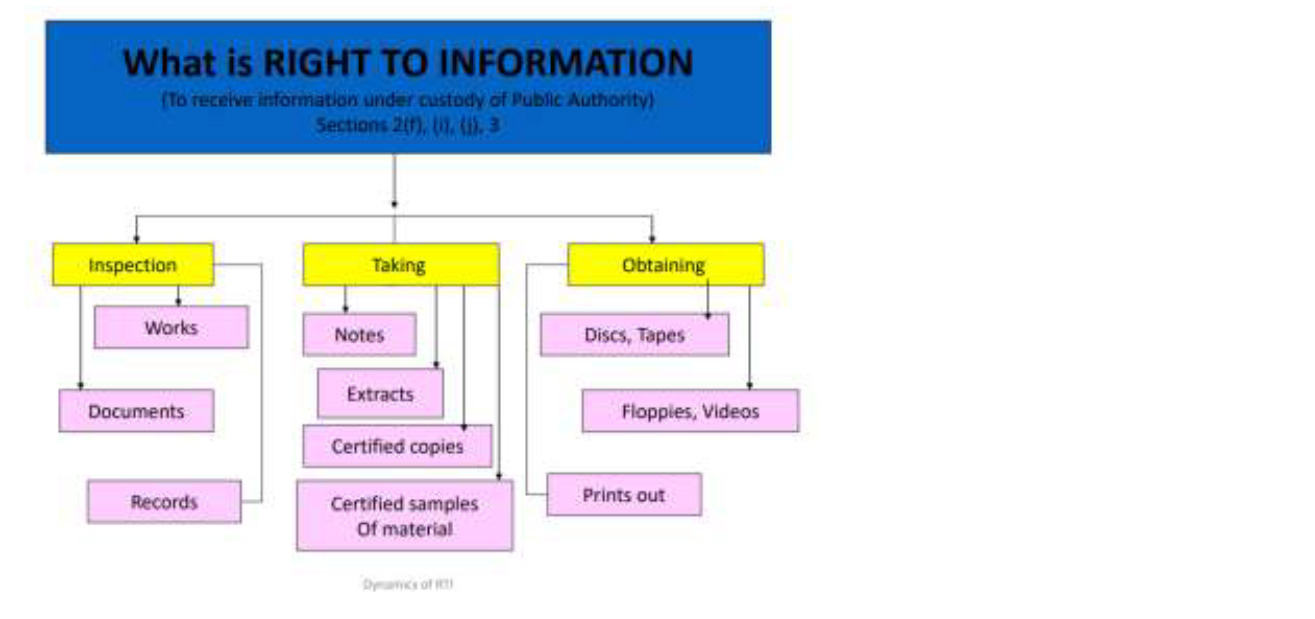
What is information?
Information includes correspondence, notes, Appendix to correspondence and Appendix to notes. File notings are an integral part of information.
Section 4
At a high level, Section 4 requires every public authority to routinely disclose information about its functions, decision-making norms, documents held, employee contacts, and budgets. Section 4 is important, but it is more of a recommendation. It should be a right. The details are provided below. If this information is made available to people proactively, there is no need for RTI.
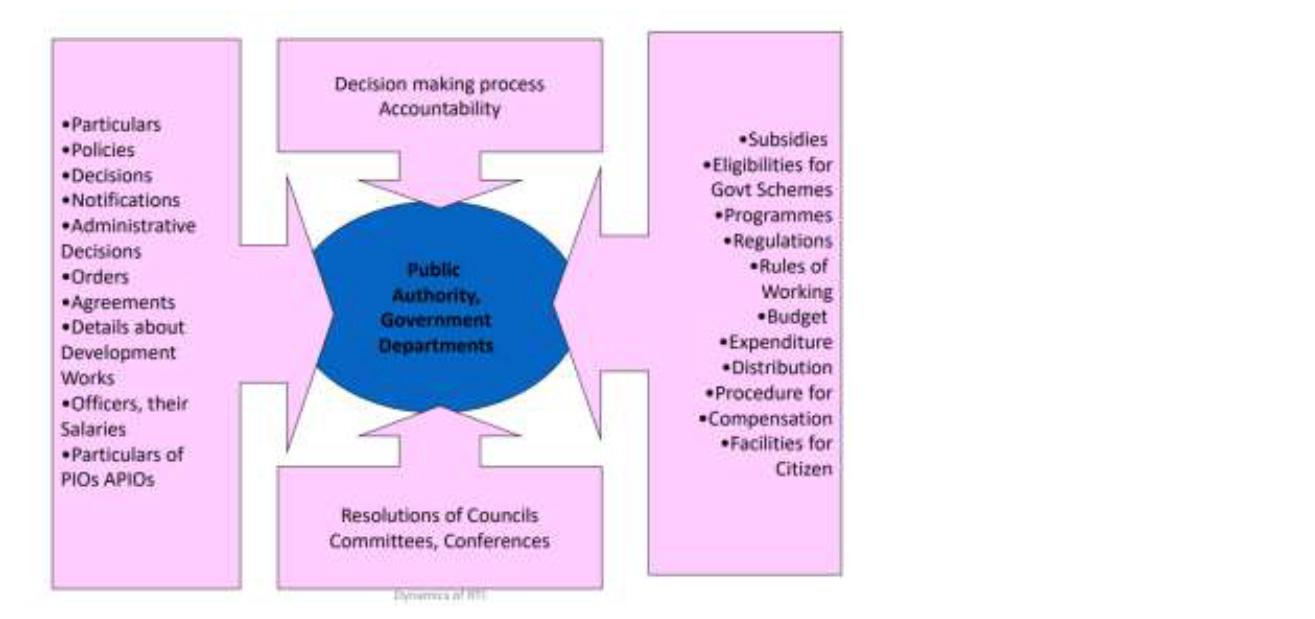
Why RTI?
The main objective of a democracy is good governance. Citizens must have the right to protect themselves from bad governance. The goodness of the government is reflected in the quality of governance. It is a constitutional right, not just an ordinary Act or legislation. It is the most empowering legislation for democracy. Articles, 14 19, and 21 are very important for democracy, including right of expression.
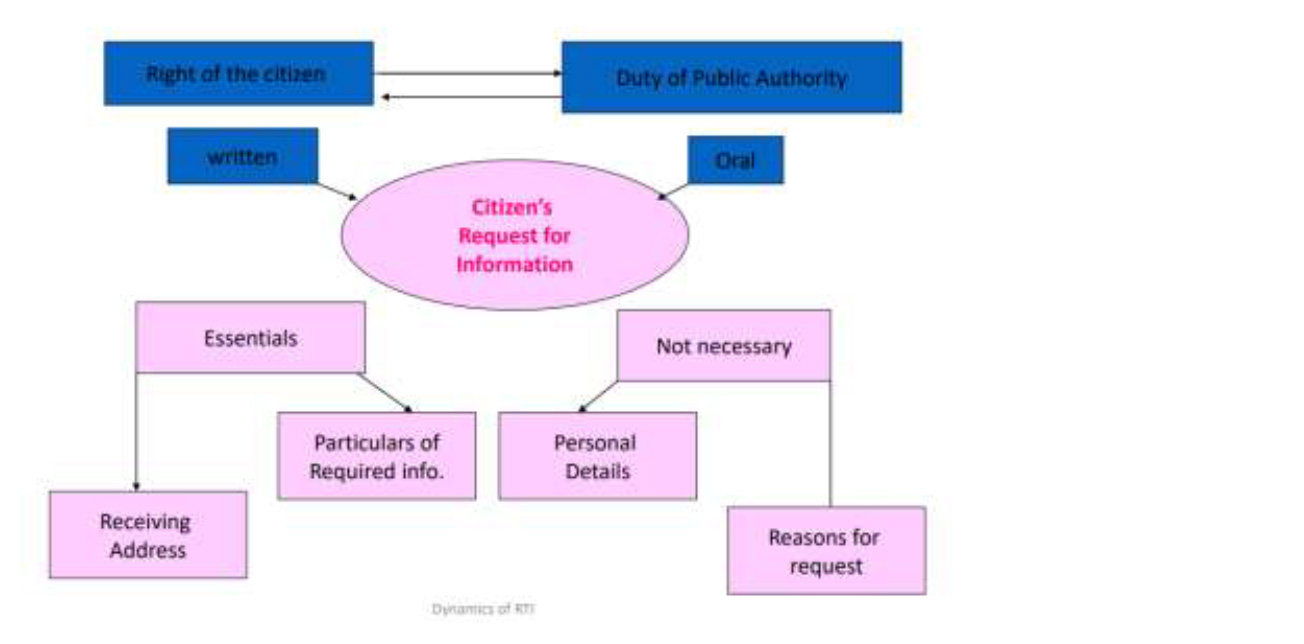
Under the RTI, the reason for requesting the information is not necessary. But if the information is refused, then a valid reason must be given by the authorities.
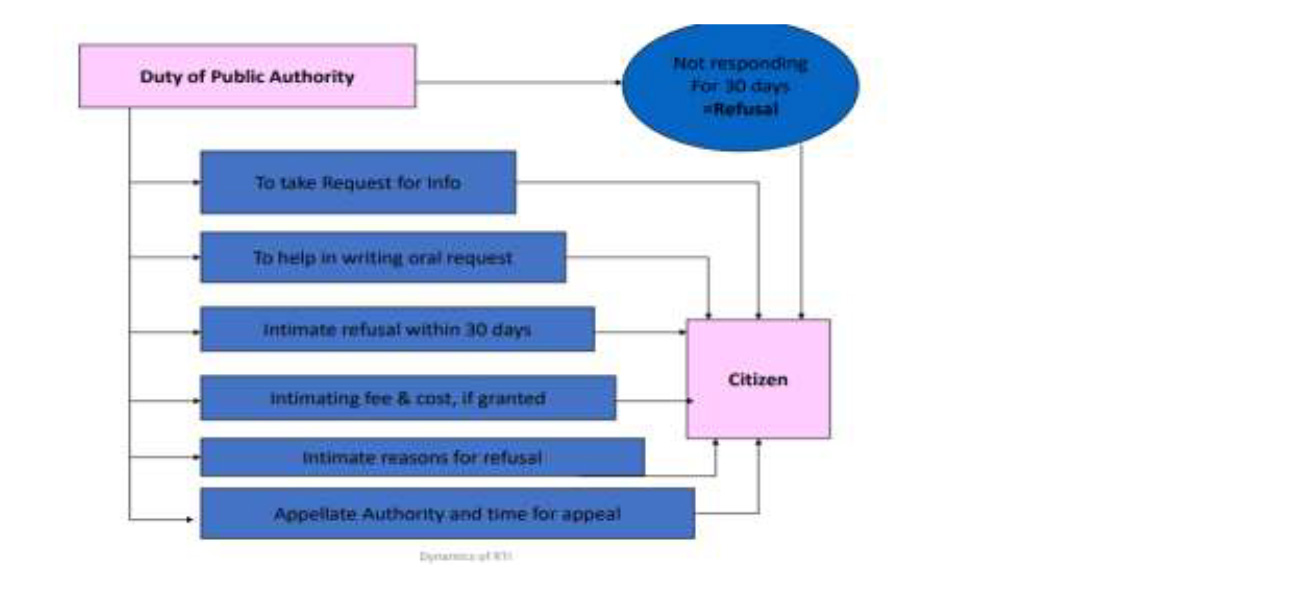 Section 8 is important. It covers information which can’t be given. There is no obligation to give any citizen an information:
Section 8 is important. It covers information which can’t be given. There is no obligation to give any citizen an information:
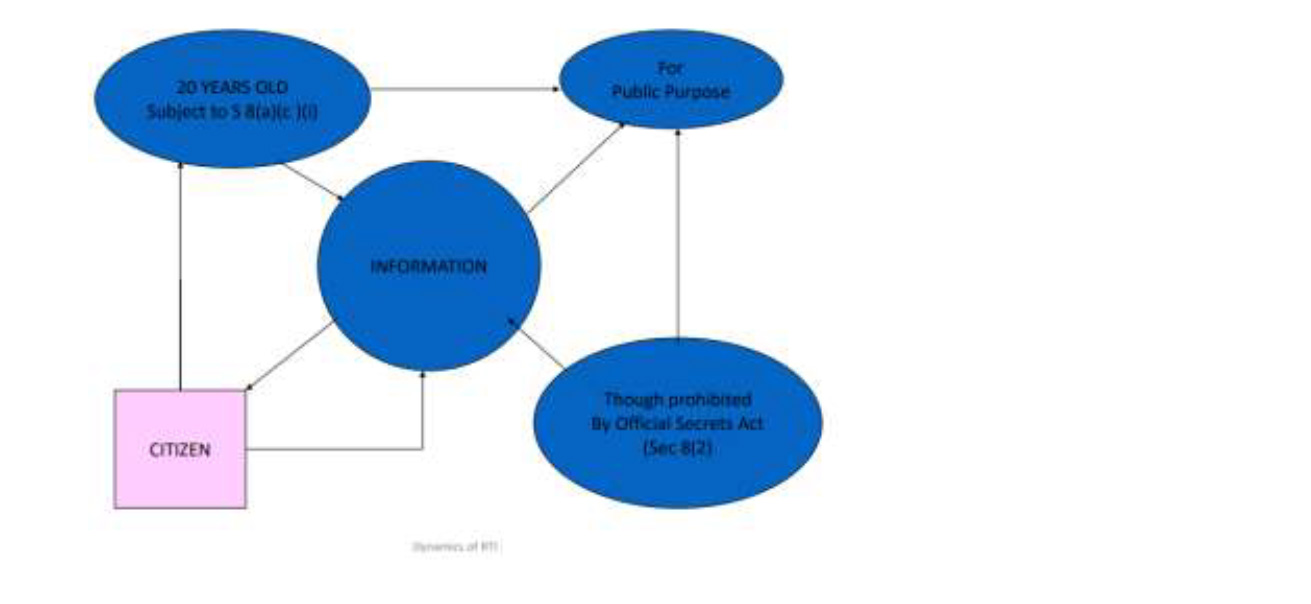
Privacy is important but we should be clear about what it means. In the name of privacy, information should not be withheld.
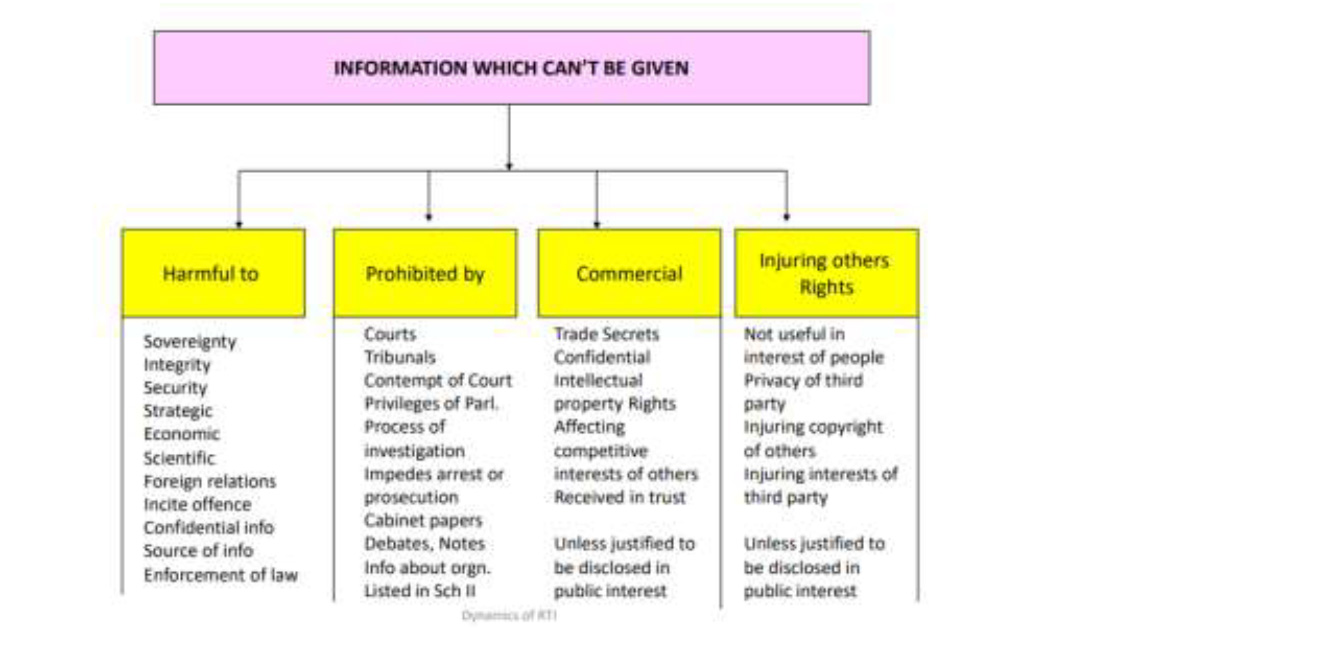
Penalties have been prescribed for not providing information.
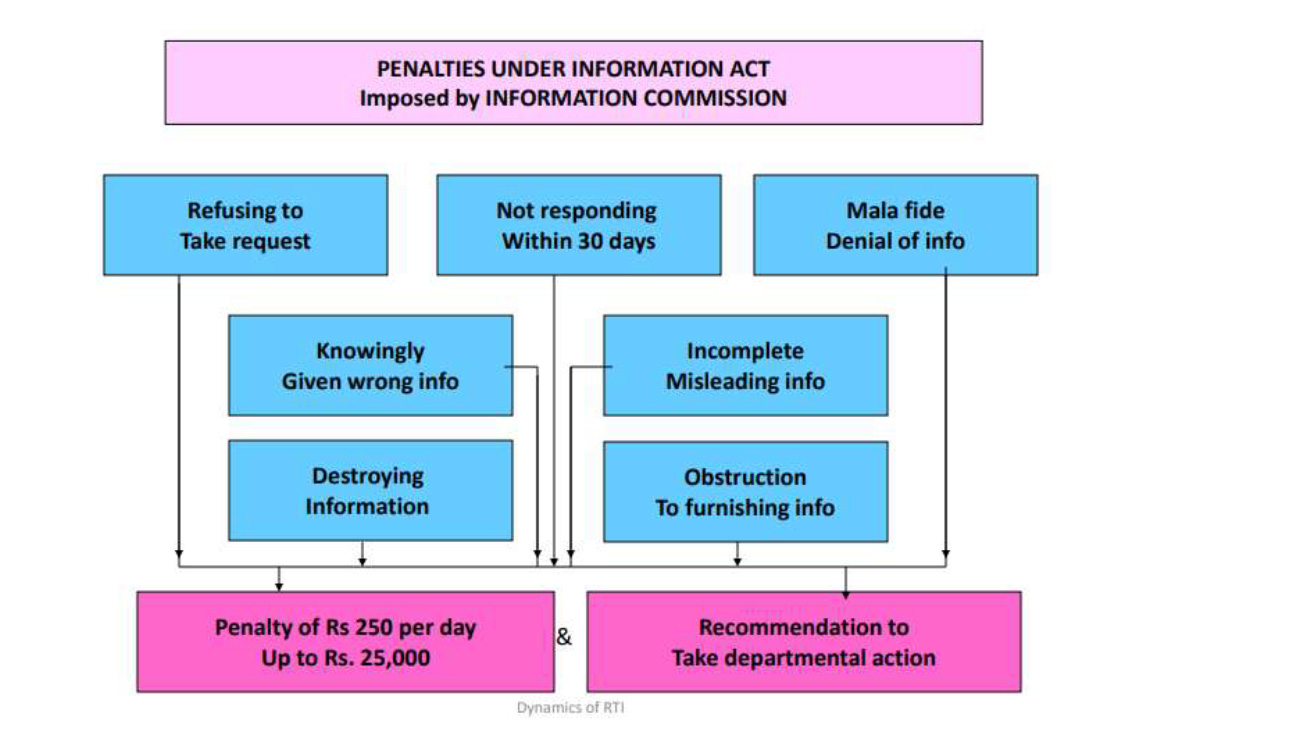
Need for supportive laws
RTI cannot be successful without- Public Records Act 1993, IT Act 2000
- Whistle Blowers Protection Act 2014
- Public Services Law and implementation of Citizens’ Charters
- Voluntary Disclosure of Information under Section
A Writ petition for Rs 10
RTI is like a ‘writ petition’ which can be filed at a cost of Rs 10. it provides the ammunition to fight bureaucratic harassment. It empowers citizens and enables them to get the information they want. As a Central Information Commissioner for the full 5 years from 2013 to 2018 Dr Sridhar delivered thousands of judgments that benefited the common man.
RTI in action: Examples
Example 1 :
Several years before RTI was passed, in the State of U. P. v. Raj Narayan, the Supreme Court observed that the Right to Information is a Fundamental right and an integral element of Article 19(1)(a).
Note: The case was filed by Raj Narain, a political activist who had contested the 1971 Lok Sabha elections against the then-Prime Minister Indira Gandhi. After losing the election, Mr Narain filed a petition seeking the disclosure of certain documents relating to the expenses incurred by Mrs Gandhi during her election campaign. The State of Uttar Pradesh, where the petition was filed, refused to disclose the documents, citing reasons of confidentiality. The case went to the Allahabad High Court, which directed the State of Uttar Pradesh to disclose the documents to Raj Narain. The state government then appealed to the Supreme Court, which upheld the decision of the High Court and ruled that the citizens have a right to know about the functioning of government agencies. The Supreme Court observed that the Right to Information is a part of the Right to Freedom of Speech and Expression guaranteed under Article 19(1)(a) of the Indian Constitution. The court held that the citizens have a right to know about the activities of public authorities.
Example 2
The husband had been posted somewhere in the north. The wife was not aware of this. She had no clue where her husband was. She successfully established contact with her husband thanks to RTI and Dr Sridhar’s ruling. This is a great example of empowerment.
Note: A resident of Akola, for instance, turned to the CIC after the Income Tax Department refused information on the income tax returns filed by her husband, who had deserted her. She wanted to find out his whereabouts through his income tax returns.
Example 3
Suppose the husband does not disclose his salary information to his wife. The wife can take resort to RTI. This was one of the famous judgments of Dr Sridhar. Dr Sridhar has ruled that every spouse has a right to information about the salary particulars of the other especially for the purpose of maintenance. He added that the details about a government employee's salary do not constitute third party information and must be voluntarily disclosed under Section 4(1)(b)(x) of the RTI Act.
Dr Sridhar argued that the salary paid to the public authority is sourced from the tax paid by the people in general and it has to be disclosed mandatorily under the RTI section.
Dr Sridhar ruled: "The information about the salary of employee or an officer of the same public authority cannot be considered as third party information. Public authorities cannot reject such RTI applications about salary under the pretext of the third-party information," he held.
Dr Sridhar warned the Home Department of Delhi government that such denial of information will be wrongful and could incur penalty. The warning was in context of an application filed by Jyoti Seherawat seeking the salary slip of her husband.
Example 4
A son wanted to have the father’s address. The aim was to get his share of the father’s pension. Dr Sridhar ruled this information need not be given.
Suppose an application is made to a government hospital to provide the medical records. It must be given to the concerned person.
Q&A
The provisions of the Act should be clearly displayed at the entrance to any government office. Some of the sincere government officers do this but it is not a universal practice. It all depends on the government of the day and the officer in charge. Under the new Telangana government, anyone can walk into a government office and ask for information.
It all depends on what we mean by private entities. When private entities have an interface with the government, the information involved may have to be disclosed. It cannot really be considered as belonging to the private entity exclusively. For example, many private hospitals may be constructed on government land. Despite being private entities, they may have to disclose some information to the public. If a husband and wife fight at home, it may be considered private information. But if either of them files a case at the police station, it is no longer private information.
The request for information may be rejected under following conditions:
The organisation is not a public authority - e.g. a Cooperative Society, or a Private corporate or Institution, not substantially financed or controlled by the Government.
Information must exist. Interpretations of law or decisions which do not exist, or reasons for decisions which do not exist will not be covered under the definition of ‘information’.
For example, ‘Why have I not got a ration card?’ is not asking for information. But ‘I want the progress of my file relating to my application for a ration card’ is asking for information.
‘Why have I not got admission?’ is not asking for information. But ‘I want the cut-off marks at which admission was granted’ is asking for information. However, the PIO should help the common man to reframe such queries.
Section 8(1) or Section 9 bar giving information which would violate private party copyright.
Extracts from records must be provided as per Section 2(j)(ii) unless it would require too much time. If the form in which the applicant has asked for information requires too much time, the PIO may offer it in another format. A common practice adopted by PIOs when the information gathering requires excessive time is to offer inspection of files to the applicant.
An amendment passed on July 25, 2019, allows the government to fix the terms and conditions of service of the CIC and Information Commissioners at the centre and in states. This has been criticized as watering down the independence of the information commissioners. For instance, the Office of the Chief Justice of India (CJI) is covered under the Right to Information (RTI) Act, 2005.
Another significant amendment was passed by the Parliament in 2023, which has removed the effect of Section 8(1)(j) that allows public interest disclosure. Because of this amendment, the RTI will not apply to ask for information from the Digital Personal Data Protection Act, 2023, relating to personal information data which leaves out the concept of disclosure based on the larger public interest. Under the Data Act, violation of provisions could invite a high penalty for a data breach of up to ₹250 crore penalty.
More than 1 crore people have asked for information under the Act. This is a large number but in relation to our population, fairly small. So more than abuse, it is the lack of utilization of the right, that is a cause for concern. Like the right to vote, we must encourage more people to use the RTI.
Certainly, the law has been abused by some people to settle personal scores. Dr Sridhar recalled that once the same individual filed 8500 questions separately, each with the prescribed fee of Rs 10. Dr Sridhar consolidated all the questions and ruled that the set of questions amounted to misuse of the right to information.
If the government becomes more transparent, the need to use RTI may decrease. Indeed, the ideal situation is that the government will provide citizens all the information they need without having to be asked. A kind of Ram Rajya.
Innovation cannot be achieved by assembling people in a conference room and telling them to innovate. For innovation to take off, the culture must be shaped and the right behaviors promoted. Formal and informal cues play a big role.
Cash will always be important be it Finance 1.0 or Finance 2.0. The nature of cash may however change from physical to digital forms. As Adi Godrej once said, sales is vanity, profit is sanity and cash is reality.
Earlier CFOs focused on conserving/protecting cash. Today, they must also take risk and generate superior returns. Some amount of leverage is also acceptable. It helps to magnify the returns for shareholders. While doing M&A, we should be careful. The sum of the parts must be greater than the individual components. Otherwise, we will end up overpaying.
Going forward, the key contribution will be bringing our perspectives and point of view to data. As technology becomes pervasive, and AI takes over many routine activities, the instinct will also be equally important. Intuition developed from experiences and mindset coupled with the ability to look at data in the right way will lead to better leadership decision making.
As the role of the CFO expands, is there a danger of the CFO transgressing the limits? Ms Sandhya has never been worried about this. She believes that if we work in the larger interests of the organization and the shared vision, we can build trust. Once we build trust, we will get the space to operate. Once we build trust, we can express ourselves. Of course, we must also be open to feedback and keep learning. We must work within the context of the organization and show progress towards meaningful goals.
We do not have to join a start up to demonstrate our entrepreneurial abilities. In our regular job, we can show our passion and agility and fire in the belly. We can be an intrapreneur in any role. To enable intrapreneurship, there must be a culture of trust and empowerment. People should be allowed to make mistakes and learn from them. A strong vision and purpose can promote togetherness and bonding. When there is greater bonding, people will support each other and there will be more risk taking. People will learn to exercise their freedom within a well-defined framework.
Motivation is easier but inspiration is more difficult. Inspiration needs vision. Inspiration is needed to bind people together and encourage them to go beyond their daily duties. Purpose is important. If every employee can relate to the purpose, they will be inspired.
A very insightful session by Ms J Sandhya. Great moderation by Prof R Prasad and Prof Sudhakar Rao.
